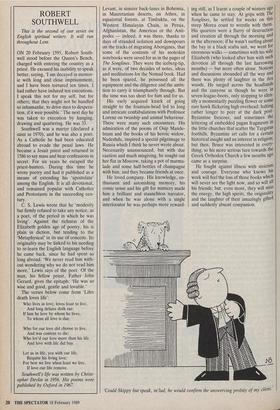ROBERT SOUTHWELL This is the second of our series on
English spiritual writers. It will run throughout Lent.
ON 20 February 1595, Robert South- well stood before the Queen's Bench, charged with entering the country as a priest. He excused his inability to speak better, saying, 'I am decayed in memor- ie with long and close imprisonment, and I have been tortured ten times. I had rather have indured ten executions. I speak this not for my self, but for others; that they might not be handled so inhumanlie, to drive men to despera- tion, if it weir possible.' The next day he was taken to execution by hanging, drawing and quartering. He was 33.
Southwell was a martyr (declared a saint in 1970), and he was also a poet. As a Catholic he had been educated abroad to evade the penal laws. He became a Jesuit priest and returned in 1586 to say mass and hear confessions in secret. For six years he escaped the priest-hunters. During this time he wrote poetry and had it published as a means of extending his 'apostolate' among the English. It is all devotional, and remained popular with Catholics and Protestants in the succeeding cen- tury.
C. S. Lewis wrote that he `modestly but firmly refused to take any notice, as a poet, of the period in which he was living'. Against the richness of the Elizabeth golden age of poetry, his is plain in diction, but tending to the `Metaphysical' in its use of conceits. Its originality may be linked to his needing to re-learn the English language before he came back, since he had spent so long abroad. 'We never read him with- out wondering why we do not read him more,' Lewis says of the poet. Of the man, his fellow priest, Father John Gerard, gives the epitaph: 'He was so wise and good, gentle and lovable.'
The verses below come from `Lifes death loves life': Who lives in love, loves least to live, And long delaies doth rue: If him he love by whom he lives, To whom all love is due.
Who for our love did choose to live, And was content to die: Who lov'd our love more than his life And love with life did buy.
Let us in life, yea with our life, Requite his living love: For best we live when least we live, If love our life remove.
South well's life was written by Christ- opher Devlin in 1956. His poems were published by Oxford in 1967.


















































 Previous page
Previous page